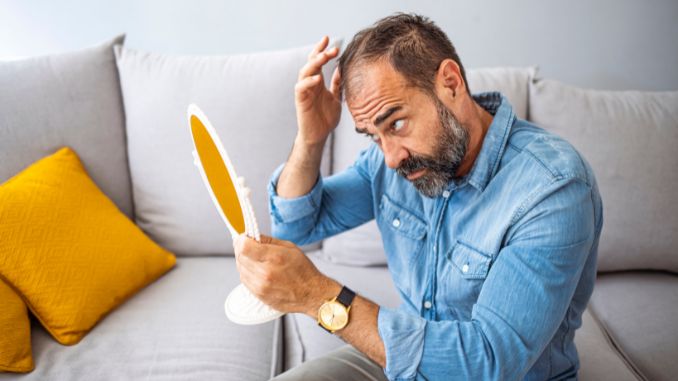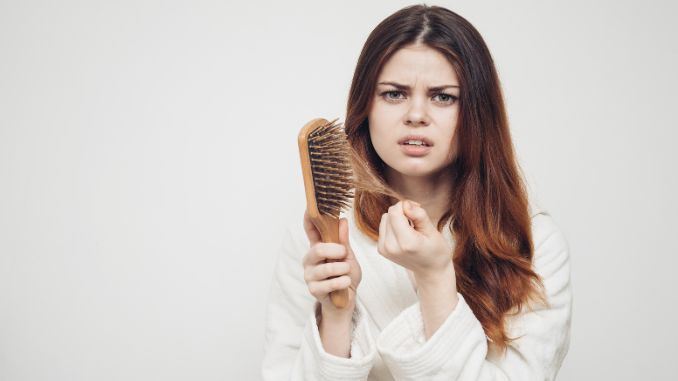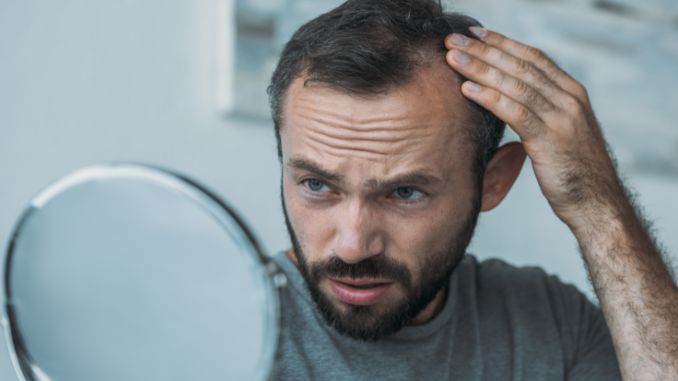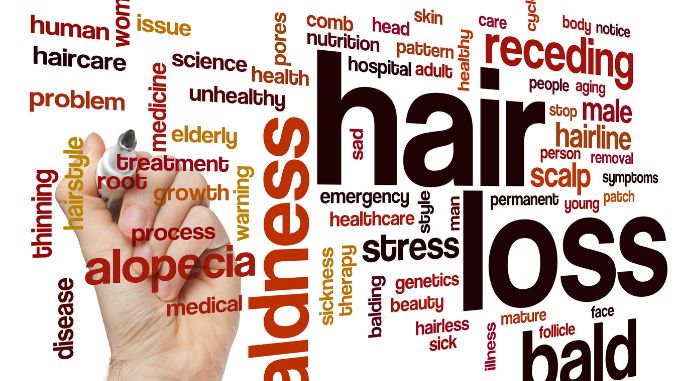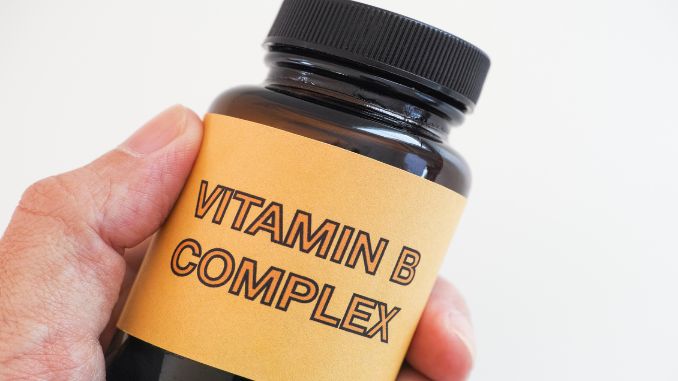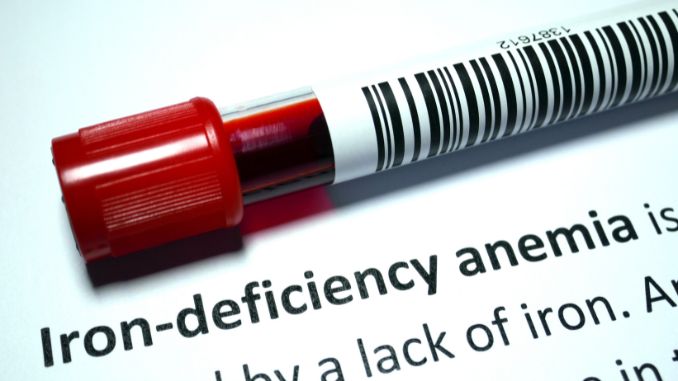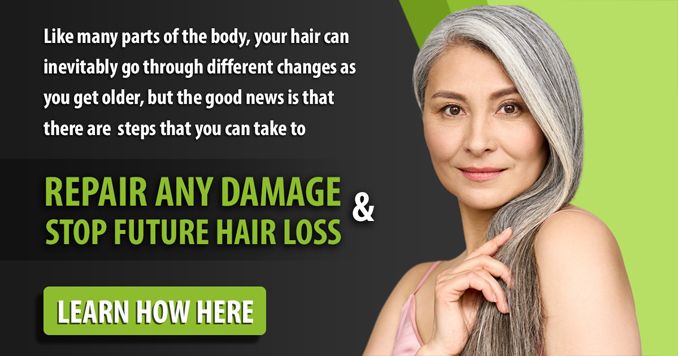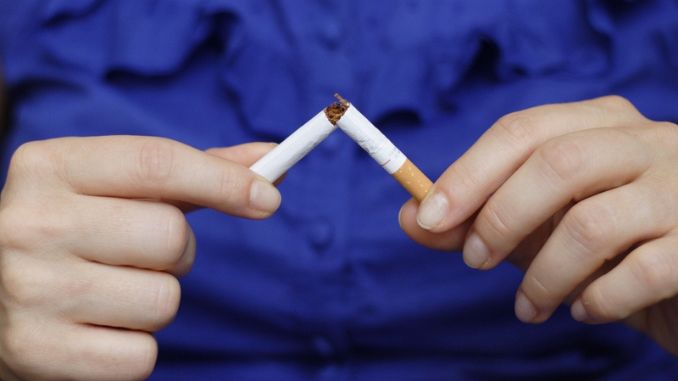Hair loss is a big worry for people worldwide. It affects how we look; it also messes our confidence and makes us more anxious. It’s tough emotionally when we see our hair getting thinner or receding. Figuring out what’s causing it can be a challenge.
This article gives practical tips to deal with its challenges and helps in the tricky task of finding out which vitamin deficiency causes hair loss. By understanding the aspects of hair loss and taking action early on, people can feel more in control of how they look and boost their confidence.
The Prevalence of Hair Loss
Hair loss is a widespread issue characterized by the gradual thinning or receding of hair, often occurring around the crown or temples. Hair shedding often increases, especially during activities such as washing or combing; this occurrence is quite common.
Surprisingly, approximately 85% of men and 33% of women will eventually encounter hair loss, underscoring its prevalence. Male pattern baldness, specifically androgenetic alopecia, constitutes a significant portion, accounting for about 95% of male hair loss cases.
In women, the most common form of hair loss is female pattern hair loss. Unlike men, female hair loss doesn’t always result in complete baldness. Instead, women typically experience diffuse thinning across the crown of the scalp. The hairline usually remains intact, but the overall volume and thickness of the hair diminish.
The significant growth of the global hair loss market to USD 2.05 billion in 2024 reflects the widespread impact of hair loss and the increasing demand for solutions. The rise in market value is driven by a growing awareness of the psychological and emotional effects of hair loss, prompting individuals to seek effective remedies.
The persistent pursuit of vitamins and supplements against hair loss is fueled by the understanding that nutritional deficiencies, including the consideration of which vitamin deficiency causes hair loss, can contribute to hair health. As people recognize the multifaceted nature of hair loss, the market responds to the ongoing quest for holistic approaches, driving innovation and expansion in the industry.
Therefore, comprehending the intricacies of hair loss is crucial in reducing its prevalence in the coming years.
Understanding the Nature of Hair Loss
A. What is Considered Hair Loss
Hair loss, referred to medically as alopecia, manifests as the partial or complete absence of hair from regions where it normally thrives. It can manifest in various forms, and what is considered hair loss depends on the degree and pattern of hair thinning or shedding. Here are some common scenarios:
1. Gradual Thinning
A gradual reduction in hair density, especially around the crown or temples, is a common sign of male or female pattern baldness.
2. Receding Hairline
Hair loss around the forehead, resulting in a receding hairline, is often observed in male pattern baldness.
3. Patchy Bald Spots
Some individuals experience hair loss in distinct, well-defined patches on the scalp, a condition known as alopecia areata.
4. Generalized Thinning
Hair thinning across the entire scalp without specific patterns may occur, often in conditions like telogen effluvium.
5. Sudden Hair Shedding
An increased rate of hair shedding, noticeable during activities like washing or combing, can indicate certain types of hair loss.
B. What Causes Hair Loss
1. Genetics
Approximately 50% of your hair health is attributed to genetics. If family members experience hair loss, you may be predisposed to similar issues. Genetics influence hair growth speed, thickness, and follicular sensitivity to hormones, particularly androgens.
Androgens, a hormone family, contribute to hair loss by accelerating hair shedding, leading to thinning. The exact mechanism of androgen impact on hair growth remains uncertain, but it may involve the production of prolactin, a hormone responsible for lactation.
2. Hormonal Imbalance
Hormones are integral in regulating various bodily functions, and their imbalance can adversely affect hair growth. Hair, being protein-based, is particularly sensitive to hormonal changes. An abnormal increase in testosterone conversion to dihydrotestosterone (DHT) is a common cause of hair loss—DHT shrinks hair follicles, leading to hair fall.
3. Medication
Medications contribute to hair loss by reducing scalp blood flow, disrupting essential hair nutrient production, and increasing sensitivity to factors causing hair loss.
4. Stress
Stress releases cortisol, a hormone with both positive and negative effects. High cortisol levels can lead to blood sugar drops, resulting in hair loss. Additionally, stress-induced weight gain reduces blood flow to hair follicles, making hair more prone to falling out. Sleep disruption due to stress further exacerbates hair loss.
5. Iron Absorption Inhibitors
Iron absorption inhibitors, such as coffee and tannins in tea, can contribute to hair loss by hindering the body’s ability to absorb sufficient iron. These compounds bind to dietary iron in the intestines, making it less available for absorption into the bloodstream.
As a result, the prolonged presence of iron absorption inhibitors in the diet may lead to reduced iron levels, potentially disrupting the production of hemoglobin and affecting the oxygen supply to hair follicles, ultimately contributing to hair thinning and loss.
6. Thyroid
Thyroid hormones are critical in regulating metabolism, including the growth and maintenance of hair. An imbalance in thyroid function, whether hypothyroidism (underactive thyroid) or hyperthyroidism (overactive thyroid), can disrupt the normal hair growth cycle.
Hypothyroidism may lead to hair thinning and increased shedding, while hyperthyroidism can trigger hair loss. Monitoring thyroid function, especially for women, is essential to promptly identify and address potential issues. Proper management of thyroid conditions can contribute to the restoration of healthy hair growth.
7. Autoimmune
Autoimmune hair loss, scientifically known as alopecia areata, is a condition where the immune system mistakenly targets and attacks hair follicles, resulting in localized hair loss.
Alopecia areata often presents as oval or round patches on the scalp or other areas of the body. For individuals experiencing more serious symptoms, it can progress to total scalp or body hair loss (alopecia totalis or alopecia universalis).
While the exact reason behind alopecia areata remains elusive, scientists believe it stems from a complex interplay of genes, environmental triggers, and potentially the immune system itself.
8. Digestion
A diet promoting digestive health is crucial, as certain foods can cause inflammation and stress, impacting the hair growth cycle. Difficult-to-process foods may lead to gastrointestinal issues, contributing to hair loss. Prioritize a diet supporting digestive well-being to maintain healthy hair.
C. Which Vitamin Deficiency Causes Hair Loss
Hair loss can often be attributed to various factors; vitamin deficiencies are among the common culprits. Increasing awareness of the role of essential vitamins in maintaining healthy hair is vital for early prevention, emphasizing the importance of a well-balanced diet and timely intervention to mitigate potential hair loss issues and support healthy hair growth. Here are vitamin deficiencies that can contribute to hair issues:
1. Vitamin D Deficiency
Vitamin D is necessary for the creation of new hair follicles. It also contributes to the regulation of immune system function, and its deficiency may trigger autoimmune reactions that affect hair health.
Without adequate vitamin D, existing hair follicles may become dormant, leading to hair thinning or loss. It’s important for maintaining the health of the hair follicles.
2. Vitamin C Deficiency
Vitamin C is crucial for collagen synthesis, a protein that provides structure to hair. Collagen is necessary for the strength and elasticity of the hair shaft.
A deficiency in vitamin C can weaken hair structure, causing it to be more prone to breakage and loss. Including vitamin C-rich foods in the diet supports overall hair health and helps maintain the integrity of hair strands.
3. Zinc Deficiency
Zinc plays a crucial function in hair tissue growth and repair. It also helps maintain the oil-secreting glands attached to hair follicles, contributing to scalp health.
Zinc deficiency can disrupt the hair growth, leading to increased hair shedding. It may also contribute to dandruff and hair thinning.
4. B Vitamins (B-complex)
B vitamins are crucial for overall hair health. They support cell growth, prevent hair loss, and promote a healthy scalp.
Deficiency in any B vitamin can impact the quality and growth of hair.
Biotin is frequently linked to positive hair health outcomes, and its deficiency may lead to hair thinning and loss.
5. Biotin Deficiency
Which Vitamin Deficiency Causes Hair Loss? – Biotin, also known as vitamin B7, is a crucial B vitamin that plays a key role in hair, nails, and skin health. It is connected to the metabolism of amino acids and the production of keratin, a protein that makes up the structure of hair.
Biotin deficiency can result in hair loss, brittle nails, and hair thinning. Since biotin is essential for keratin production, inadequate levels may weaken hair structure and increase susceptibility to breakage.
6. Iron Deficiency
Which Vitamin Deficiency Causes Hair Loss? – Iron is important for transporting oxygen to cells, including hair follicles. Adequate iron levels ensure proper cell function, including those responsible for hair growth and maintenance.
Iron deficiency can cause a condition known as iron deficiency anemia, which may result in reduced oxygen supply to the hair follicles. This can disorganize the hair growth cycle, leading to increased hair shedding and potentially stunted hair growth. Iron deficiency is often associated with brittle, dry, and easily breakable hair.
7. Vitamin E Deficiency
Though not as frequently associated with hair loss as other vitamins, vitamin E remains crucial for maintaining healthy skin and hair. Insufficient levels of vitamin E can contribute to suboptimal scalp health, potentially affecting hair growth. Thus, ensuring adequate intake of vitamin E is essential for overall hair and skin well-being.
8. Selenium Excess
Thanks to its antioxidant properties, this essential trace element, selenium, is your body’s secret weapon against oxidative stress.
While selenium is necessary for overall health, excess levels can adversely affect hair. High selenium levels may contribute to hair loss by causing damage to hair follicles. Maintaining a proper balance of selenium is crucial for overall health and preventing potential negative impacts on hair.
It’s important to note that maintaining a nutritionally complete diet that includes these essential vitamins and minerals is key to promoting overall health, including the health of your hair. If you suspect a deficiency, seek advice from your healthcare professional for proper diagnosis and guidance.
D. What Can Prevent Hair Loss?
1. Stress Reduction Techniques
Calming your mind through activities like meditation, deep breathing exercises, or moments of silence can significantly reduce stress, which is beneficial for preventing hair loss. Stress can negatively impact hair health, particularly for conditions like alopecia areata.
2. Nutrient-rich Diet with Colorful Foods
Prioritize fresh, colorful fruits and vegetables in your diet to ensure an intake of essential vitamins, minerals, and micronutrients crucial for healthy hair growth. Certain amino acids and vitamin B6, found in fruits like strawberries and bananas, play a pivotal role in supporting hair growth.
3. Balanced Diet for Blood Sugar Control
Decrease dairy, sugar, meat protein, and soy intake to help maintain balanced blood sugar levels, reducing the risk of hair loss. High or low blood sugar levels can negatively impact hair, skin, and nails. Reducing sugar intake also helps prevent inflammation, which can contribute to hair loss.
4. Start Your Day with Nutrient-Dense Foods
Begin your day with live, colorful foods such as fresh fruits and vegetables to promote healthy hair growth. These foods, rich in vitamins and minerals, are essential for supporting the growth of strong, vibrant hair. Including non-dairy protein sources is also beneficial.
5. Limit Processed Foods
Avoiding processed foods high in refined carbs and sugars helps maintain stable blood sugar levels, crucial for healthy and vibrant hair. These foods can cause spikes and crashes in blood sugar, affecting hormones responsible for hair health and potentially contributing to hair loss.
6. Prioritize Quality Sleep
Establish healthy sleeping habits to reduce stress, improve blood flow, and balance hormones, all of which are essential for healthy hair growth. Quality sleep supports the production of melatonin, a hormone linked to hair growth, and helps manage stress, a potential contributor to hair loss.
7. Supplement with Multivitamins
Incorporate multivitamins into your routine to provide nutrients that stop hair loss and boost healthy growth. These supplements offer a comprehensive blend of vitamins and minerals crucial for optimal bodily function and healthy hair follicles.
8. Probiotics for Stronger Hair Roots
Harness the benefits of probiotics to strengthen hair roots, enhance follicle function, and reduce inflammation. Improved blood flow to hair follicles and the regulation of hormones related to hair loss make probiotics a valuable addition to your hair care routine.
9. Hydration for Hair Growth
Prioritize water intake to promote hair growth by aiding nutrient absorption, maintaining hydration, and reducing stress. Proper hydration supports serotonin production, a hormone that fights against hair loss. Women should aim for 2.7 liters or 11 cups, while men should consume 3. 7 liters or 15 cups daily.
Take Away
Gaining a profound understanding of the multifaceted aspects of hair loss is essential for bolstering confidence and addressing this widespread concern globally. Awareness of the contributing factors enables individuals to adopt crucial care routines and provide essential nutrients for healthy hair.
Taking a holistic approach, including strategies for stress reduction, maintaining a balanced diet, and prioritizing adequate sleep and hydration, empowers individuals to manage their appearance actively. This not only enhances personal confidence but also significantly impacts mental health.
The connection between confidence, self-assurance, and mental well-being is crucial, as feeling good about one’s appearance can positively influence self-esteem, reduce stress levels, and contribute to an overall sense of happiness and resilience. By prioritizing these holistic elements, we address hair loss and contribute to a healthier, more mentally resilient global community.
Discover vibrant, healthy hair! Decode the link between vitamin deficiencies and hair loss in our guide. Nourish your hair with effective solutions. Check out our Master Guide to Healthy Hair. Take charge of your hair’s well-being today!

Rick Kaselj MS, is a leading kinesiologist and injury specialist as well as co-creator of the best-selling Unlock Your Hip Flexors program. Rick creates exercise programs that help people heal injuries and eliminate pain, so they can go back to living a full, active, healthy life.

